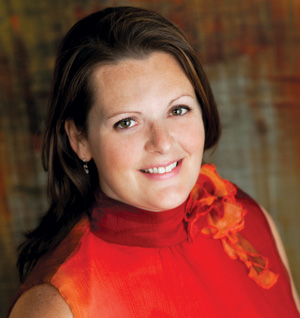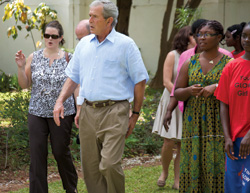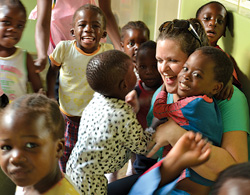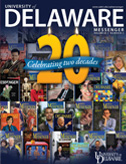Relief coordinator fights AIDS epidemic in Zambia

ALUMNI | Kristie Fitzwater Mikus, AS02M, has a gentle voice and a communication style so genuine and personable that it's easy to imagine her making friends and getting along with almost everyone.
It seems fitting for someone who considers her job "largely personality-driven."
Reading people, anticipating problems, working well with those in all sectors of government—those soft skills prove invaluable when managing the efforts to implement AIDS relief in a country where nearly one in seven adults lives with the disease and one-tenth of the population consists of AIDS-orphaned children.
"It's not without tears," she admits. "It's hard, emotional work. But it's important."


Mikus is the country coordinator in Zambia for the U.S. President's Emergency Plan for AIDS Relief (PEPFAR). The largest health initiative in history, PEPFAR directly supports life-saving antiretroviral treatment for more than 3.9 million men, women and children worldwide.
In Zambia, one of the resource-limited recipient countries with high HIV/AIDS prevalence rates, Mikus oversees a $306 million annual budget and leads the ongoing negotiations and collaborations to set joint United States government and government of the Republic of Zambia priorities for the country's national response to the disease.
It's a job that involves meeting with the partner country government, civil society, other donors and stakeholders and coordinating the efforts of five U.S. agencies tasked with slowing the spread of the epidemic.
Most recently, Mikus served as the lead for George W. Bush's trip to Zambia in early December, organizing his and Laura Bush's visit and discussing her role over lunch with the former president. "We were speaking the same language," she says. "He had the vision for PEPFAR in 2003, and I was privileged to be one of many people who turned that vision into a reality."
Later in December, she traveled to Dallas, where she made a presentation before the George W. Bush Institute and several key private-sector partners on how to use the PEPFAR platform to combat breast and cervical cancer in women in Zambia.
Mikus is quick to note that her reality—living in Zambia, managing a program that has saved millions of lives—has roots in Newark, Del. Or as she puts it, "I wouldn't be where I am today had it not been for UD."
From Graham Hall to Ghana
A 2002 Master of Public Administration graduate of the School of Public Policy and Administration (then the School of Urban Affairs and Public Policy), Mikus credits her faculty mentors and her experience as an intern in Ghana—her first ever visit to Africa—as her "entrée into this kind of work."
"I knew I wanted to work internationally, and the UD faculty helped make that happen," she says.
Her professors and mentors—Arno Loessner, James Flynn and Jerome Lewis— helped her secure a paid summer internship in Ghana, where she managed a democratic decentralization program that taught newly elected mayors best practices in public policy. As a graduate student, Mikus worked on the program from Loessner's office. Away on medical leave at the time, he advised her by phone on how to implement the program, step by step.
It was "discovery learning" at its best.
"Here I was, this young, white woman, thinking that newly elected mayors would want to know about managing budgets for their districts," she remembers, "and they were asking about waste disposal."
When she returned to campus, Flynn suggested she apply for the Presidential Management Fellowship, a highly competitive, fast-track career program in the federal government.
Making a difference in Washington
Mikus was awarded the fellowship, and in 2002, she began working at the Department of Commerce on international trade, particularly in the pharmaceutical and biotechnology sector. It was a time when antiretroviral drugs were very expensive, and "big pharma was getting clobbered for not offering discounts," she says.
So when the Office of the United States Global AIDS Coordinator was established in 2004, her boss at the Commerce Department immediately pulled her on board, saying, "You've got to go to the State Department to work on this initiative."
Mikus was in awe. "OK," she said. "When?"
"Monday morning."
As one of only eight people in the newly created office at the State Department, Mikus says she "did a little bit of everything." She wrote speeches and congressional reports, served as the Global Fund representative and private-sector liaison and led the country programming of four of the original 15 focus nations.
"Everyone was there for the common good," she says. "People were dying, and our only concern was, 'What could we do today to make this better?' There was a real sense of urgency."
Nearly a decade later, the numbers alone tell the success of the program, with millions of lives saved and death rates significantly reduced.
Making a difference abroad
For Mikus, there are other measures of success. And of need.
Since assuming the role of PEPFAR country coordinator in Zambia in 2008, she has toured prisons, in which incarcerated women often share their cells with their young children, and hospitals, where it's not unusual to find two or three people sharing the same bed.
A married mother of two, Mikus thinks most often of the women and children.
A few years back, she visited a province in western Zambia to tour a U.S.-supported program. To receive funding, organizations were required to have an income-generating component for sustainability purposes. In this instance, women who cared for orphaned babies chose to plant soy and raise chickens.
Their money went into agriculture; their surplus bought formula. And when they couldn't afford the milk, the babies were fed cooking oil.
"You see something like this, and you take off your U.S. government hat," says Mikus. "You're just a woman, a mother, wondering how to help."
And that, she says, is what keeps her going.
"I'd like to stay overseas for as long as I can," she adds. "It's making me a better person."
Article by Artika Rangan Casini, AS05





